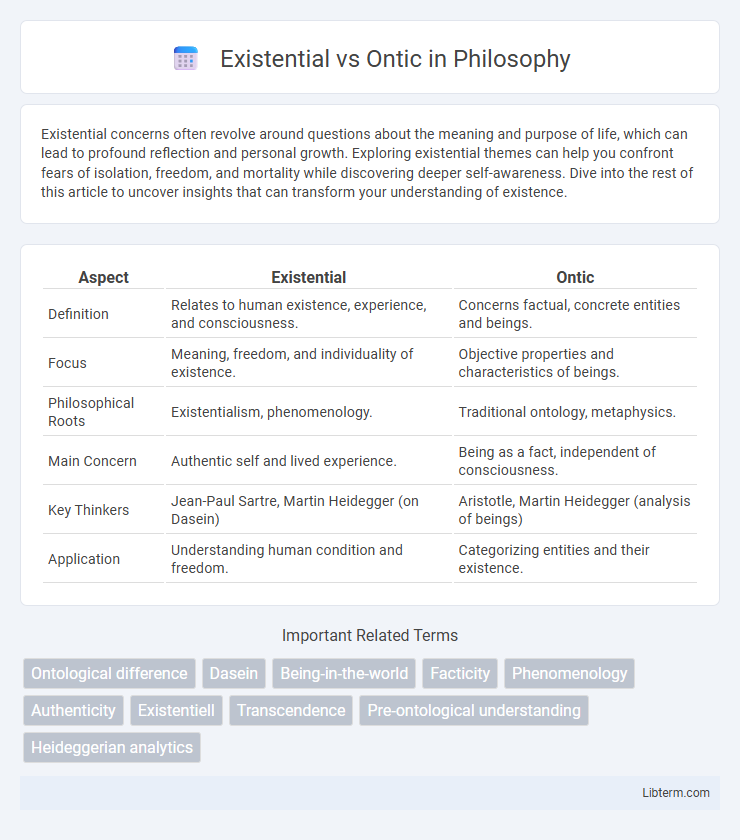Existential concerns often revolve around questions about the meaning and purpose of life, which can lead to profound reflection and personal growth. Exploring existential themes can help you confront fears of isolation, freedom, and mortality while discovering deeper self-awareness. Dive into the rest of this article to uncover insights that can transform your understanding of existence.
Table of Comparison
| Aspect | Existential | Ontic |
|---|---|---|
| Definition | Relates to human existence, experience, and consciousness. | Concerns factual, concrete entities and beings. |
| Focus | Meaning, freedom, and individuality of existence. | Objective properties and characteristics of beings. |
| Philosophical Roots | Existentialism, phenomenology. | Traditional ontology, metaphysics. |
| Main Concern | Authentic self and lived experience. | Being as a fact, independent of consciousness. |
| Key Thinkers | Jean-Paul Sartre, Martin Heidegger (on Dasein) | Aristotle, Martin Heidegger (analysis of beings) |
| Application | Understanding human condition and freedom. | Categorizing entities and their existence. |
Introduction to Existential and Ontic Concepts
Existential concepts refer to the fundamental conditions of being, emphasizing the nature of existence itself, while ontic concepts relate to the specific entities and facts that constitute reality. In philosophy, existential analysis explores questions about human existence, freedom, and meaning, whereas ontic inquiry examines the properties and structures of objects independently of human experience. Understanding the distinction between existential and ontic perspectives is crucial for comprehending debates in metaphysics and existential phenomenology.
Defining Existential: Philosophy and Meaning
Existential pertains to the human condition, emphasizing individual experience, freedom, and the search for meaning within philosophical inquiry. It explores how existence precedes essence, highlighting consciousness, choice, and authenticity in defining selfhood and purpose. Existential philosophy addresses fundamental questions about being, mortality, and the significance of life in a subjective and phenomenological context.
Understanding Ontic: Reality and Being
Understanding ontic involves examining the fundamental nature of reality and being as concrete, individual entities with distinct properties and existence. Ontic inquiry focuses on what exists independently of perception or interpretation, emphasizing the factual state of things in contrast to existential concerns about meaning and experience. This approach enables philosophers and scientists to analyze the structural and material aspects of reality that constitute the essence of being.
Historical Background of Existential and Ontic Distinctions
The historical background of the existential versus ontic distinction traces back to Martin Heidegger's philosophy, where he differentiated "ontic" as the factual aspects of beings and "existential" as the structures of human existence that reveal being itself. This distinction emerged from Heidegger's seminal work "Being and Time" (1927), which shifted focus from abstract ontology to the lived experience and intentionality of Dasein, or human being-there. Subsequent existentialist thinkers like Jean-Paul Sartre developed these themes by emphasizing individual freedom and subjectivity as foundational to understanding existence beyond mere ontic facts.
Key Differences: Existential vs Ontic Perspectives
Existential perspectives emphasize human experience, freedom, and authenticity, focusing on the meaning of existence and personal being. Ontic perspectives analyze the concrete, factual aspects of entities, addressing what physically exists independently of human interpretation. Key differences lie in existentialism's concern with subjective meaning versus ontology's exploration of objective reality.
Existentialists’ Approach to Existence
Existentialists emphasize the primacy of individual existence, asserting that human beings define their essence through lived experience and personal choice. Unlike ontic considerations that focus on the factual aspects of being, existentialism prioritizes subjective meaning, freedom, and authenticity in shaping one's existence. This approach highlights the responsibility each person holds in creating purpose amid an inherently absurd or indifferent world.
Ontic Approach in Philosophy and Science
The ontic approach in philosophy and science centers on the study of entities as they exist independently of perception or interpretation, emphasizing objective reality and factual existence. It involves analyzing the properties, structures, and relations of beings in their concrete form, often aligning with scientific methodologies that prioritize empirical observation and measurable phenomena. Ontic inquiry contrasts with existential perspectives by focusing on what is rather than human experiences or meanings attached to existence.
Applications of Existential and Ontic Analysis
Existential analysis applies primarily in psychotherapy and counseling, helping individuals explore their authentic existence, personal freedom, and responsibility to create meaningful life choices. Ontic analysis focuses on the concrete facts and empirical realities of being, often utilized in philosophy, science, and ontology to examine the nature of existence and the properties of entities. Combining existential and ontic approaches enhances interdisciplinary research by bridging subjective human experience with objective analysis of being.
Common Misconceptions about Existential and Ontic
Common misconceptions about existential and ontic elements often confuse their distinct philosophical scopes; existential pertains to the nature of existence and being itself, while ontic refers to the concrete facts and properties of particular entities. Many mistakenly treat ontic details as merely existential concepts, overlooking how ontic realities ground and inform existential inquiries without being reducible to them. Understanding this differentiation is crucial for accurate discussions in metaphysics and ontology.
Conclusion: Relevance of Existential and Ontic in Modern Discourse
Existential and ontic concepts critically shape modern philosophical and linguistic discourse by distinguishing between the nature of being and specific entities' existence. Emphasizing existential concerns addresses human experiences and consciousness, while ontic analysis targets objective facts and individual occurrences. Integrating both perspectives enhances nuanced understanding and effective communication in contemporary debates across metaphysics, ethics, and social sciences.
Existential Infographic

 libterm.com
libterm.com